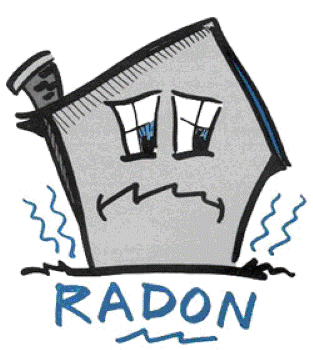Portland Home Tests: Radon Gas

What’s invisible, odorless, creeps in your basement, and kills 21,000 people a year in the US alone according to the EPA?
The answer is radon gas, and to be more specific, it comes from naturally occurring uranium in the rocks and soil underneath homes, including many in the Portland, Oregon area. And homes without basements can have a radon problem, although it is less likely.
Pro tip: If your Portland home is on a crawlspace, be sure that all the crawlspace vents are open and not blocked with debris. If the crawlspace is open and well ventilated the chances of failing a Radon test drop to nearly zero in the Portland area.
Here’s what you need to know: Radon gas entering your home – or the Portland home you’re thinking of buying – is a serious concern, but it is easy to test and relatively easy to mitigate if detected.
Most home inspectors in Portland will test a home for radon as part of their inspection, but this is just to protect home buyers. If you’re a homeowner, you should test your home for radon now if it hasn’t been done in the last few years. That’s because radon tests themselves can take some time, and you’ll definitely want to deal with the problem if the test comes back with higher than the accepted safe level of radon in your home.
How does the radon level in the average Portland home compare to the rest of the country? Technically speaking, each home is different – a high-radon-tested home can be next to one with no radon detected at all. But in general, the soil beneath Portland is more likely to contain uranium because it comes from granite sediment washed down from Montana at the end of the last ice age (the scientist’s best guess anyway). As uranium breaks down, it emits radioactive radon gas. This radioactivity is what causes health effects – chiefly lung cancer – among those who are exposed. A study by Portland Sate University last year showed that 79% of zip codes in the Portland metro area have high or moderate levels of radon gas. See a good Portland Radon zip code map here.
What do you do if your Portland home doesn’t pass the radon test? Several fixes (usually called mitigation solutions) are available, but one thing to check is your basement or crawlspace’s vents. Many homeowners block or cover these to improve heating efficiency, but they in doing so you may be inadvertently trapping radon that would otherwise escape harmlessly into the atmosphere.
If your home still has higher-than-acceptable radon levels, it’s important to arrange for mitigation by a professional right away. Not only is your health at risk, but your home value will suffer. Because radon gas can enter your home through gaps around service pipes, cracks in the floor and even construction joints, mitigation focuses on venting the radon from its source underneath the house, to somewhere away from doors or windows. In the Portland area, a contractor will charge anywhere from $1,000 to $6,000 for radon mitigation, depending on how the gas is getting in.
If your Portland home does need this kind of work, be sure to use a certified radon mitigation contractor.
The good news is, if your home was built with a radon barrier or had a mitigation system installed after construction, you have an advantage in the Portland real estate market! Knowing that they’re safe from this toxic basement creeper will give home buyers another reason to love your home.


